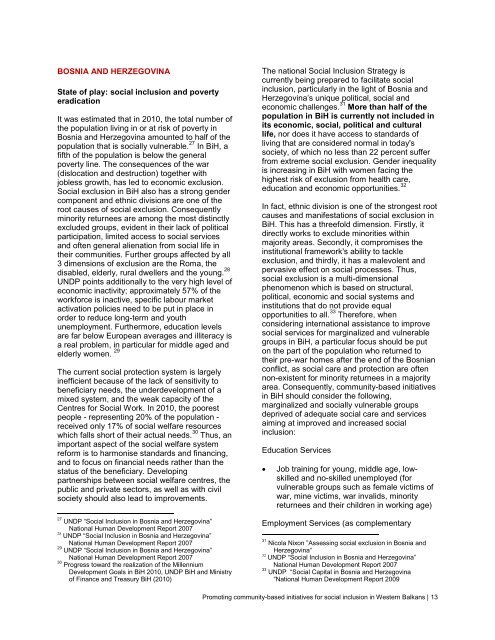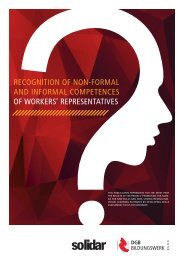Promoting community-based initiatives for social inclusion ... - Solidar
Promoting community-based initiatives for social inclusion ... - Solidar
Promoting community-based initiatives for social inclusion ... - Solidar
Create successful ePaper yourself
Turn your PDF publications into a flip-book with our unique Google optimized e-Paper software.
BOSNIA AND HERZEGOVINA<br />
State of play: <strong>social</strong> <strong>inclusion</strong> and poverty<br />
eradication<br />
It was estimated that in 2010, the total number of<br />
the population living in or at risk of poverty in<br />
Bosnia and Herzegovina amounted to half of the<br />
population that is <strong>social</strong>ly vulnerable. 27 In BiH, a<br />
fifth of the population is below the general<br />
poverty line. The consequences of the war<br />
(dislocation and destruction) together with<br />
jobless growth, has led to economic exclusion.<br />
Social exclusion in BiH also has a strong gender<br />
component and ethnic divisions are one of the<br />
root causes of <strong>social</strong> exclusion. Consequently<br />
minority returnees are among the most distinctly<br />
excluded groups, evident in their lack of political<br />
participation, limited access to <strong>social</strong> services<br />
and often general alienation from <strong>social</strong> life in<br />
their communities. Further groups affected by all<br />
3 dimensions of exclusion are the Roma, the<br />
disabled, elderly, rural dwellers and the young. 28<br />
UNDP points additionally to the very high level of<br />
economic inactivity; approximately 57% of the<br />
work<strong>for</strong>ce is inactive, specific labour market<br />
activation policies need to be put in place in<br />
order to reduce long-term and youth<br />
unemployment. Furthermore, education levels<br />
are far below European averages and illiteracy is<br />
a real problem, in particular <strong>for</strong> middle aged and<br />
elderly women. 29<br />
The current <strong>social</strong> protection system is largely<br />
inefficient because of the lack of sensitivity to<br />
beneficiary needs, the underdevelopment of a<br />
mixed system, and the weak capacity of the<br />
Centres <strong>for</strong> Social Work. In 2010, the poorest<br />
people - representing 20% of the population -<br />
received only 17% of <strong>social</strong> welfare resources<br />
which falls short of their actual needs. 30 Thus, an<br />
important aspect of the <strong>social</strong> welfare system<br />
re<strong>for</strong>m is to harmonise standards and financing,<br />
and to focus on financial needs rather than the<br />
status of the beneficiary. Developing<br />
partnerships between <strong>social</strong> welfare centres, the<br />
public and private sectors, as well as with civil<br />
society should also lead to improvements.<br />
27 UNDP “Social Inclusion in Bosnia and Herzegovina”<br />
National Human Development Report 2007<br />
28 UNDP “Social Inclusion in Bosnia and Herzegovina”<br />
National Human Development Report 2007<br />
29 UNDP “Social Inclusion in Bosnia and Herzegovina”<br />
National Human Development Report 2007<br />
30 Progress toward the realization of the Millennium<br />
Development Goals in BiH 2010, UNDP BiH and Ministry<br />
of Finance and Treasury BiH (2010)<br />
The national Social Inclusion Strategy is<br />
currently being prepared to facilitate <strong>social</strong><br />
<strong>inclusion</strong>, particularly in the light of Bosnia and<br />
Herzegovina‟s unique political, <strong>social</strong> and<br />
economic challenges. 31 More than half of the<br />
population in BiH is currently not included in<br />
its economic, <strong>social</strong>, political and cultural<br />
life, nor does it have access to standards of<br />
living that are considered normal in today's<br />
society, of which no less than 22 percent suffer<br />
from extreme <strong>social</strong> exclusion. Gender inequality<br />
is increasing in BiH with women facing the<br />
highest risk of exclusion from health care,<br />
education and economic opportunities. 32<br />
In fact, ethnic division is one of the strongest root<br />
causes and manifestations of <strong>social</strong> exclusion in<br />
BiH. This has a threefold dimension. Firstly, it<br />
directly works to exclude minorities within<br />
majority areas. Secondly, it compromises the<br />
institutional framework's ability to tackle<br />
exclusion, and thirdly, it has a malevolent and<br />
pervasive effect on <strong>social</strong> processes. Thus,<br />
<strong>social</strong> exclusion is a multi-dimensional<br />
phenomenon which is <strong>based</strong> on structural,<br />
political, economic and <strong>social</strong> systems and<br />
institutions that do not provide equal<br />
opportunities to all. 33 There<strong>for</strong>e, when<br />
considering international assistance to improve<br />
<strong>social</strong> services <strong>for</strong> marginalized and vulnerable<br />
groups in BiH, a particular focus should be put<br />
on the part of the population who returned to<br />
their pre-war homes after the end of the Bosnian<br />
conflict, as <strong>social</strong> care and protection are often<br />
non-existent <strong>for</strong> minority returnees in a majority<br />
area. Consequently, <strong>community</strong>-<strong>based</strong> <strong>initiatives</strong><br />
in BiH should consider the following,<br />
marginalized and <strong>social</strong>ly vulnerable groups<br />
deprived of adequate <strong>social</strong> care and services<br />
aiming at improved and increased <strong>social</strong><br />
<strong>inclusion</strong>:<br />
Education Services<br />
<br />
Job training <strong>for</strong> young, middle age, lowskilled<br />
and no-skilled unemployed (<strong>for</strong><br />
vulnerable groups such as female victims of<br />
war, mine victims, war invalids, minority<br />
returnees and their children in working age)<br />
Employment Services (as complementary<br />
31 Nicola Nixon ”Assessing <strong>social</strong> exclusion in Bosnia and<br />
Herzegovina“<br />
32 UNDP “Social Inclusion in Bosnia and Herzegovina”<br />
National Human Development Report 2007<br />
33 UNDP “Social Capital in Bosnia and Herzegovina<br />
“National Human Development Report 2009<br />
<strong>Promoting</strong> <strong>community</strong>-<strong>based</strong> <strong>initiatives</strong> <strong>for</strong> <strong>social</strong> <strong>inclusion</strong> in Western Balkans | 13
















